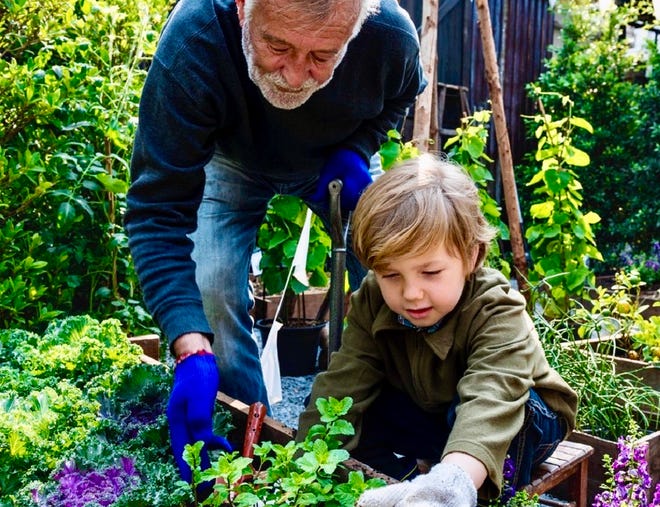
![A little help from Dad comes in handy when deciding whether a plant that appears in a raised bed is a weed. [Contributed photo]](http://www.grandmashealthykidsclub.com/wp-content/uploads/2020/08/roger-mercer-heres-how-to-involve-children-in-gardening-the-fayetteville-observer.jpg)
Dear Roger: My little girl will be 9 in September. She wants to help in the fall vegetable garden. And she wants to grow her own flowers. But there are many things she is too young to do. I think the exercise would be good for her. Any suggestions? — Brenda Carter, Fayetteville
Dear Brenda: There are many ways to involve children in gardening.
And you’re right about exercise being important. But the exercise must be fun if your child is going to benefit emotionally as well as physically.
Many children spend far more time in front of TVs, computers or phones than they do getting exercise. Your daughter might be far more capable physically than you expect. Let her try, then pitch in when the going gets too tough for her.
In addition to fitness and togetherness, gardening should provide your child a chance to enjoy success in nurturing other living things. Qualities the child will develop might include keenness of observation, appreciation of plants and insects, and capacity to become increasingly responsible by reaping the pleasure and rewards of responsible behavior.
Here are several suggestions that will help make gardening fun and successful for your child:
• Let her have her own garden, or let her grow one or two plants of her own. You may set aside a 5-foot by 10-foot area, if she shows strong interest. Don’t burden her with too much space or too much tedious work. Agree in advance to work up the soil for her garden and yours at the same time, so there is not an impossible job for your child to do.
• Select colorful and easy-to-grow plants. Pansies and snapdragons come to mind for fall planting. Then give her a choice among them. Children almost always like marigolds and cherry tomatoes in summer. But giant collards are fun for spring and fall. Take care to avoid plants your child does not find attractive or tasty. Edible podded peas, started by the middle of September, will make a fine crop.
A friendly contest to see who can grow the largest radish, turnip or cabbage, or the earliest one, might be just the thing. Let your child grow a plant or two of the same tomato variety you are growing. Let her follow you through your planting, watering, soil preparation, weeding and fertilizing procedures, then let her do her thing. Don’t spend too much time correcting her. But do suggest corrections of any errors that are likely to lead to failure.
• Help her learn how to plant bedding plants, such as pot marigolds and flowering cabbage and kale. Teach her how deep and how far apart to plant. But don’t overdo the instruction. Let your child do it all, if she wants to, after showing her with one or two plants. Keep in mind that your child can quickly lose interest if you are not keenly interested in what she is doing.
• Draw your child’s attention to plants’ needs for watering, pollination by insects and other interesting phenomena.
• Offer to help with weeds, if she will help you pull a few of yours. Don’t just go out and pull her weeds, unless the two of you have agreed that is what you will do. Teach your child how to mulch to keep down weeds and reduce the need for watering, but only if she thinks it’s a good idea.
• Be sure you and your child agree on what is to be done. Your child may not be interested in flowers or in pulling weeds. She may just want to grow one giant watermelon plant next summer. Period. Don’t leave loose ends about any gardening agreements. If your child doesn’t understand and choose a commitment freely, you may be setting her up for failure.
• If she wants to help but doesn’t want to take responsibility for her own garden patch, you might give her a few simple chores, such as watering. With some planning, you can occupy your child for quite a long time while the two of you have an excellent opportunity to talk in a peaceful setting.
• Schedule time when you and your child can be in the garden together. And help your child stick to the schedule.
• Don’t be critical and don’t talk about what should have been done. Do insist that if you and your child make an agreement that you both live up to the terms. Make sure your child is able and interested in keeping up her part of the bargain.
• Don’t rush out to spray your child’s garden when a few bugs appear. Instead, enjoy observing the insects with your child, and tell her how much the bugs like her garden and how much they appreciate what she has done. Let the child decide what to do about the bugs.
• Don’t tell your child that she is derelict about pulling weeds. Instead, tell her how much the weeds like the spot she has prepared, and ask whether she’d like to take out some of them so her violas get the water the weeds are now stealing from them. Give your child the option to weed. If the child is overwhelmed, ask if she wants help. She might just enjoy the weeds as much as the vegetables.
• Help your child distinguish weeds from desirable plants before she starts pulling things up. This is especially necessary when she starts with seeds she sows herself.
Send your questions and comments to Roger at orders@mercergarden.com or call 910-424-4756. You may messege photos and text to that number. Send pest or plant samples to Roger at 6215 Maude St., Fayetteville, N.C. 28306